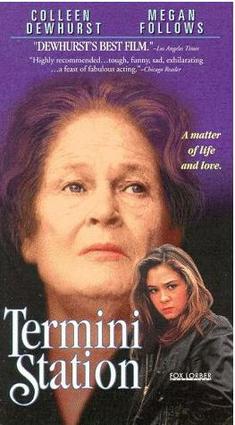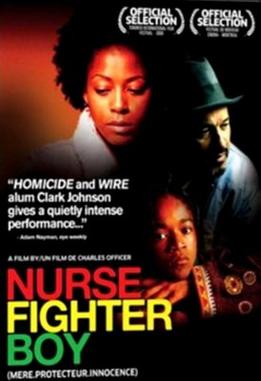Related Research Articles

Good Riddance is a 1980 French-language Canadian drama film. Directed by Francis Mankiewicz and written by Réjean Ducharme, the film concerns Manon, an unstable young girl who lives with her mother Michelle and her alcoholic and intellectually disabled uncle Ti-Guy.
Jeremy Podeswa is a Canadian film and television director. He is best known for directing the films The Five Senses (1999) and Fugitive Pieces (2007). He has also worked as director on the television shows Six Feet Under, Nip/Tuck, The Tudors, Queer as Folk, and the HBO World War II miniseries The Pacific. He has also written several films.

Termini Station is a 1989 Canadian drama film directed by Allan King and written by Colleen Murphy.
The Michelle Apartments is a 1995 Canadian black comedy film directed by John Pozer and written by Ross Weber.
The Academy of Canadian Cinema and Television presents an annual award for Best Motion Picture to the best Canadian film of the year.

The Five Senses is a 1999 Canadian drama film directed, written and produced by Jeremy Podeswa.
The Canadian Screen Award for Best Live Action Short Drama is awarded by the Academy of Canadian Cinema and Television to the best Canadian live action short film. Formerly part of the Genie Awards, since 2012 it has been presented as part of the Canadian Screen Awards.
Malarek is a Canadian drama film, directed by Roger Cardinal and released in 1988. Based on the memoirs of Canadian investigative journalist Victor Malarek, the film stars Elias Koteas as Malarek during his early career in journalism.

Young People Fucking is a 2008 Canadian sex comedy film directed by Martin Gero, who co-wrote it with Aaron Abrams. The film's story is told in a linear fashion, alternating through a series of single-location vignettes connected by theme but with characters representing different archetypes. In each vignette, the characters try to have an evening of uncomplicated sex but are unable to separate sex from love.

The Eclipse: Courtship of the Sun and Moon is a French silent film made in 1907 by director Georges Méliès.
Darrell Wasyk is a Canadian film director.

H is a 1990 Canadian film written, directed, and produced by Darrell Wasyk.

Nurse.Fighter.Boy is a Canadian drama film, directed by Charles Officer and released in 2008. The film stars Karen LeBlanc as Jude, a widowed single mother undergoing treatment for sickle cell disease. While working as a night-shift nurse to support her son Ciel, she meets and enters into a relationship with Silence, a troubled and brooding boxer who becomes a father figure for the young boy.
Eldorado is a Canadian drama film, released in 1995. Directed by Charles Binamé and written by Binamé and Lorraine Richard in conjunction with its main stars, the film focuses on six young residents of Montreal trying to make sense of their directionless lives.
Wiebke von Carolsfeld is a German Canadian film director, writer and editor. Her debut feature film as a director, Marion Bridge, won the Toronto International Film Festival Award for Best Canadian First Feature Film at the 2002 Toronto International Film Festival.
Camelia Frieberg is a Canadian film producer and director. She is a two-time winner of the Genie Award for Best Picture, as producer of Atom Egoyan's films Exotica and The Sweet Hereafter.
The Toronto New Wave refers to a loose-knit group of filmmakers from Toronto who came of age during the 1980s and early 1990s.
Impolite is a Canadian mystery film, directed by David Hauka and released in 1992. The film stars Robert Wisden as Jack Yeats, a burned-out journalist who is investigating the death of wealthy businessman Naples O'Rorke.
Two Can Play is a Canadian drama film, directed by Micheline Lanctôt and released in 1993. The film stars Pascale Bussières and Pascale Paroissien as adult sisters meeting for the first time, not having previously known of each other's existence, and intersperses the dramatic storyline with scenes in which the actresses are interviewed about the process of building their characters.
The Falling is a Canadian thriller drama film, directed by Raul Sanchez Inglis and released in 1998. The film centres on a love triangle between Lars, Karis and Morgan.
References
- ↑ Gerald Pratley, A Century of Canadian Cinema. Lynx Images, 2003. ISBN 1-894073-21-5. p. 68.
- ↑ "Sex sells in Canadian cinema: Jeremy Podeswa's Eclipse". Canadian Press, April 17, 1995.
- 1 2 Jay Stone, "Eclipse symbolism a pretentious bore". Ottawa Citizen , April 21, 1995.
- ↑ Jane Stevenson, "Toronto festival promises hot Canadian films: Cannes winner in national showcase". Kingston Whig-Standard , July 29, 1994.
- ↑ Rick Groen, "Bodies, rest and motion". The Globe and Mail , April 7, 1995.
- ↑ Lloyd Dykk, "Light, dark but not enough shade in Eclipse". Vancouver Sun , April 7, 1995.
- ↑ "Nominees for the 1995 Genie Awards". Canadian Press, November 7, 1995.